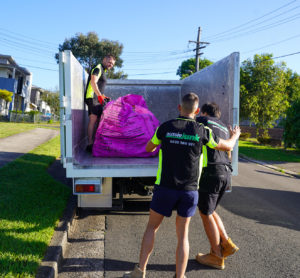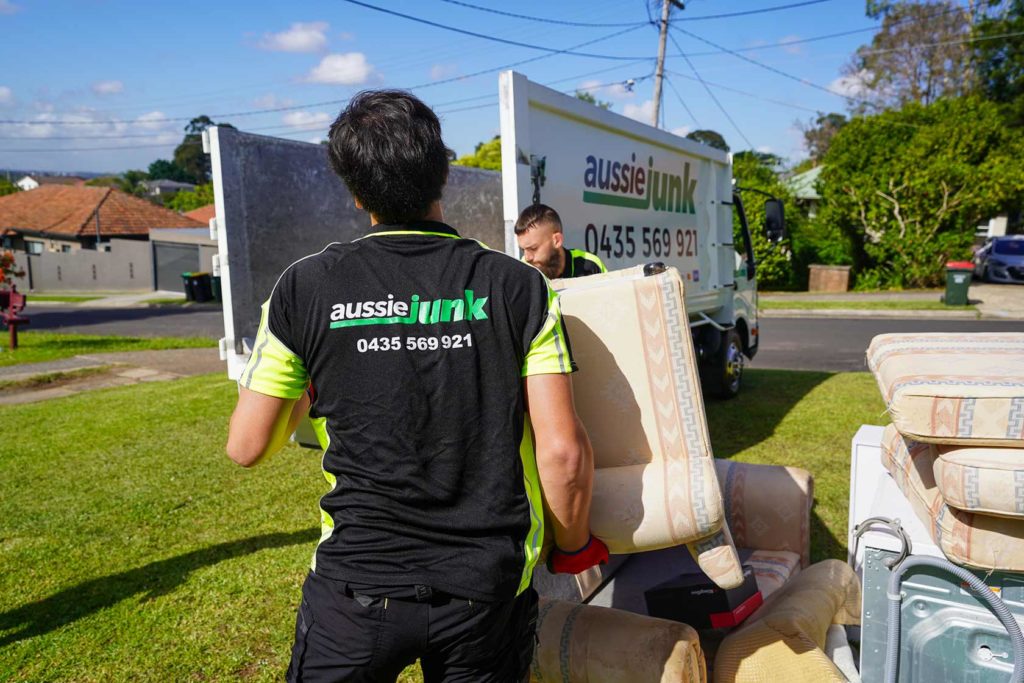Need a clear path through the clutter? Tackle your extra rubbish with practical solutions outlined in this guide on “how to get rid of extra rubbish.” Here, we lay out the steps to identify, reduce, and responsibly dispose of your waste, ensuring a tidier space and a healthier planet. Get ready to clear your home of rubbish, one efficient move at a time.
Key Takeaways
- Diversifying rubbish disposal methods, such as donating, composting, and utilising local services, helps address different types of waste while benefiting the environment and the community.
- Upcycling and reusing items not only reduces landfill waste but also allows for creative expression and sustainable living, enhancing personal spaces with unique, repurposed elements.
- Minimising the production of waste by choosing reusable items, reducing packaging, and embracing digital alternatives are fundamental to sustainable waste management and environmental conservation.
Understanding Different Types of Rubbish
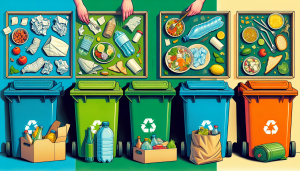
Understanding the diverse landscape of waste is the cornerstone of effective rubbish removal. Household waste is not just about what fills up your general waste bin; it extends to items like broken furniture, filing cabinets from a home office clear-out, or the remnants of a redecorating spree. Recognizing that our household rubbish is part of a larger picture that includes solid waste from industrial and commercial activities, as well as garden waste, is crucial. Packaging that once cocooned our online shopping hauls and the products we use daily contribute to a larger environmental narrative. Dumping rubbish irresponsibly can have a significant impact on our environment and communities.
Plastic waste, from the ubiquitous plastic bags to the disposable cutlery that accompanies our take-out meals, is a significant challenge, particularly as various plastics bear different resin identification codes, dictating their recyclability. Additionally, liquid waste from households, industries, and medical facilities presents unique challenges. It requires treatment to prevent the contamination of our precious water sources and broader environment.
With this knowledge, let’s dive into how we can take charge of the rubbish we generate.
Reusing and Upcycling Items

The adage that one person’s junk is another’s treasure has never been truer when it comes to reusing and upcycling. By breathing new life into unwanted household items, we not only divert them from landfills but also add a touch of personal flair to our homes. Have you ever considered turning an old wine bottle into a bespoke glass serving dish or repurposing Altoid tins into quaint jewellery boxes? The possibilities stretch as far as your imagination dares to reach.
For those who thrive on more complex projects, think of the potential in:
- used tires reborn as quirky garden planters
- transforming a vintage suitcase into a retro boombox
- old jeans becoming chic handbags
- hardback books evolving into unique lamp bases
Upcycling isn’t just about saving the planet; it’s about unleashing your creativity and crafting a more personalised, sustainable lifestyle.
Donating Unwanted Items
While the idea of decluttering is liberating, the thought of your once-cherished items ending up in a landfill can be disheartening. Fear not, for donating unwanted items is a win-win solution. By gifting these goods to charity shops or passing them on to family members, you not only clear space in your home but also potentially enrich someone else’s life. Imagine the joy your gently used washing machine might bring to a family in need or the difference a bundle of clothes could make to those facing hard times.
Moreover, by donating, you are actively participating in a larger effort to conserve the environment. Usable goods like filing cabinets or storage solutions are diverted from the waste stream, reducing the pressure on our already burdened landfills. So, the next time you’re contemplating the fate of your unused possessions, remember that your act of giving can have a ripple effect, fostering community well-being and environmental health.
Breaking Down and Reducing Waste Volume
Tackling the volume of waste can be likened to a strategic game, where the goal is to minimise its presence and impact on our wallets. By breaking down larger items, like furniture that has seen better days, we can make them more palatable for waste removal services that often charge by volume. This diligence not only ensures that these items are accepted for removal but also presents a cost-effective approach to rubbish disposal.
Careful sorting and recycling further contribute to this volume-reducing quest. Glass, for instance, can be deposited at local bottle banks, significantly diminishing the bulk of your household rubbish. And let’s not forget the financial angle; reducing the amount of junk by removing the unnecessary or ensuring that only essential items are collected can lead to noticeable savings. Placing a recycling bin at home can make this process even more convenient.
In essence, reducing waste volume is not just a practical move; it’s an economical one.
Composting Organic Waste
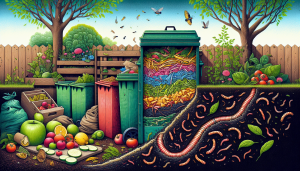
The topic of composting may seem daunting to some, but it’s essentially nature’s way of recycling. By composting organic waste like food scraps and garden trimmings, we contribute to a natural cycle that enriches the soil and reduces landfill waste. The magic of compost lies in its ability to transform our kitchen leftovers into a nutrient-rich soil amendment, bolstering plant growth and aiding in moisture retention.
Moreover, adopting composting practices can be a key player in climate adaptation. By improving the soil’s water absorption and retention capabilities, we prepare our gardens and landscapes to better withstand extreme weather events. And with up to a quarter of household waste being compostable, the potential for reducing the volume of trash needing disposal is significant.
So, roll up your sleeves and start composting; your garden, and the planet, will thank you.
Hiring a Rubbish Removal Service
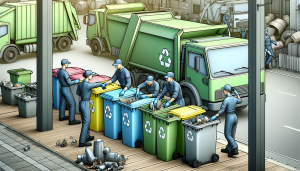
Sometimes, the task of waste disposal requires a professional touch. Companies like Rubbish Taxi are examples of professional rubbish removal companies offering same-day removal services, alleviating the stress and physical burden of dealing with various waste types, from the mundane to the bulky and everything in between. It’s crucial to choose a professional rubbish removal company for handling different types of household waste, including hazardous and liquid waste, and ensuring the right items are sent to the correct facilities for recycling.
Opting for a professional waste removal service offers several benefits:
- Your waste is handled responsibly
- Clear pricing systems and free quotes aid your decision-making process
- Supporting local rubbish removal businesses bolsters the local economy
- You receive a reliable and timely service tailored to your needs
So when the rubbish becomes too much to handle, remember that there are experts ready to whisk it away.
Using Skip Bins for Large Rubbish Loads
For those times when the volume of waste defies the confines of your wheelie bins, skip bins emerge as the heroes of rubbish removal. These large containers can be hired to manage substantial amounts of waste, whether from a home renovation project or a significant clean-up. With sizes ranging from 2 to 8 cubic metres, there’s a skip bin for every scenario, and the convenience of having one delivered and picked up from your property is undeniable.
However, before you get too skip-happy, it’s important to consider your specific situation. Ensure you have adequate space for the bin and that you’re aware of the types of waste permitted within it. With services typically available seven days a week, skip bins offer a flexible solution to your large-scale waste problems.
So next time you’re faced with a daunting amount of rubbish, remember that skip bins might just be the answer you’re looking for.
Proper Disposal of Hazardous Waste
When it comes to waste, not all rubbish is created equal. Hazardous waste, with its potential for harm, stands in a category all its own. This includes everything from household chemicals and batteries to medical waste that requires careful handling to prevent environmental and health risks. Inadequate disposal of such materials could lead to grave consequences, contaminating our soil, water, and air, and posing long-term threats to both human health and wildlife.
Thankfully, specialised services exist to manage the safe disposal of these risky substances. From Paintback programs for paint disposal to community initiatives for recycling mobile phones and chemical containers, there are avenues to ensure these materials don’t wreak havoc on our ecosystem. By utilising professional rubbish removal services that are well-versed in dealing with hazardous waste, we contribute to the protection of our environment and take a stand against pollution.
When disposing of these dangerous items, it’s crucial to do so with the utmost care and consideration for our planet’s well-being.
Visiting Your Local Recycling Centre
Recycling centres serve as the gatekeepers of sustainability, ensuring that the waste we generate is given a second life. These facilities are instrumental in managing recyclable materials, transforming them into new products, and preventing them from languishing in landfills. As a collection point for various items, whether it’s plastic drinking bottles, whole glasses, or even shampoo and detergent bottles, recycling centres are equipped to handle a variety of materials.
But what about the excess household waste that doesn’t fit in your wheelie bin? Rather than letting it pile up, consider taking it to your local recycling centre, where you can dispose of it responsibly and, often, free of charge. By making regular trips to these centres, you’re not just getting rid of rubbish; you’re contributing to a circular economy that values resources and reduces our environmental footprint.
Reducing Waste Production

The ultimate strategy in waste management isn’t just about disposing of rubbish efficiently; it’s about reducing the amount we produce in the first place. By embracing reusable items such as:
- grocery bags
- water bottles
- coffee cups
- food containers
- utensils
By opting for products with minimal or recyclable packaging, we can make significant strides in cutting down household waste and food waste. Ditching single-use food containers and utensils in favour of durable alternatives is another impactful way to reduce our personal waste footprint.
Shopping locally at farmers markets and buying in bulk can also curtail the amount of packaging waste we bring into our homes. And in our increasingly digital world, opting for electronic bills and subscriptions can drastically reduce paper waste. By adopting these simple yet effective habits, we can all play a part in preserving our environment for future generations.
Summary
Throughout this guide, we’ve explored a myriad of strategies to manage the ever-growing issue of waste. From understanding different types of rubbish to reusing and upcycling, donating, composting, and engaging professional removal services, each method serves as a vital link in the chain of sustainability. By reducing waste production and properly disposing of hazardous materials, we pave the way for a healthier planet. Let’s continue to embrace these strategies, not just as tasks to be completed, but as a collective commitment to a cleaner, greener world.
Frequently Asked Questions
What types of items can I compost at home?
You can compost items such as fruit and vegetable peels, coffee grounds, yard trimmings, and paper to reduce landfill waste and enhance soil health. Composting these materials at home is a sustainable way to manage organic waste.
Can I get rid of bulky items like furniture through regular rubbish removal services?
No, you should check with your local council for special pick-up services and their specific rules and schedules. These services are often provided for bulky items like furniture.
Are there any items I shouldn’t donate to charity shops?
You should avoid donating hazardous materials, broken appliances, or items that are not in usable condition to charity shops. Always check with the shop before donating.
How can I ensure that my hazardous waste is disposed of correctly?
To ensure your hazardous waste is disposed of correctly, utilise specialised disposal services and programs available for different hazardous materials to prevent environmental contamination and ensure safe disposal.
Is it more environmentally friendly to hire a rubbish removal service or use skip bins for large waste disposal?
Both rubbish removal services and skip bins can be environmentally friendly if waste is recycled and disposed of responsibly. Consider your specific needs, such as the amount of waste and convenience, when deciding between the two options.
